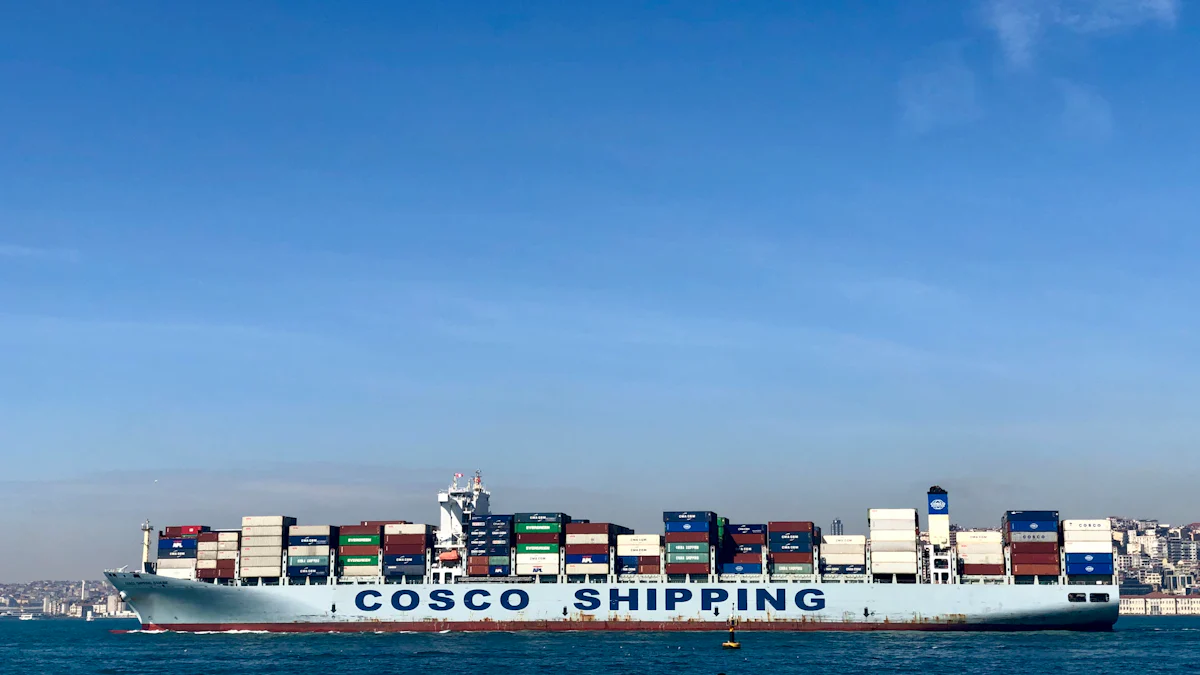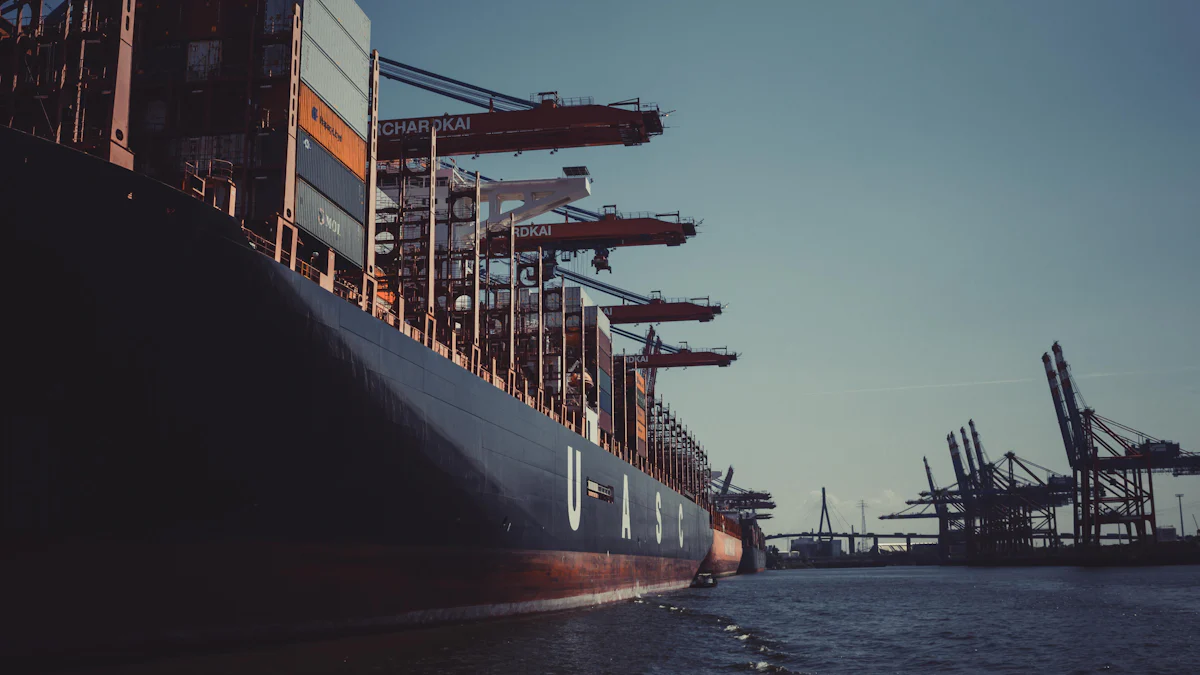Comprehensive Guide to Freight Efficiency: China to Mexico

Freight efficiency plays a crucial role in global trade. The trade volume between China and Mexico reached over $121 billion last year. Mexico imported goods worth $114 billion from China. This highlights the importance of optimizing shipping processes. Effective Freight Solutions ensure timely delivery and cost savings. The demand for container shipping from China to Mexico increased significantly, with a growth rate of 34.8% in 2023. Understanding these dynamics helps businesses enhance their supply chain resilience.
Freight Solutions: Shipping Methods from China to Mexico

Air Freight Solutions
Advantages of Air Freight
Air freight provides a swift solution for transporting goods from China to Mexico. Businesses benefit from the speed of air freight, which typically takes between 5 to 7 days. This rapid delivery is crucial for time-sensitive shipments. High-value items often require the security and efficiency that air freight offers. The reliability of air freight ensures consistent delivery schedules, minimizing delays. Air freight solutions also offer flexibility in terms of flight frequency and routing options.
Disadvantages of Air Freight
Despite its speed, air freight comes with higher costs compared to other methods. The expense can be prohibitive for businesses with tight budgets. Air freight also has a significant carbon footprint, impacting environmental sustainability. Limited cargo space restricts the volume of goods that can be transported at once. This limitation makes air freight less suitable for bulk shipments. Additionally, certain hazardous materials face restrictions when transported by air.
Ocean Freight Solutions
Advantages of Ocean Freight
Ocean freight stands out as a cost-effective option for shipping large volumes of goods. Businesses find ocean freight ideal for non-time-sensitive cargo due to its affordability. The capacity of ocean freight allows for the transportation of bulky and heavy items. This method supports economies of scale, reducing costs per unit. Ocean freight solutions also contribute to lower carbon emissions per ton-mile compared to air freight.
Disadvantages of Ocean Freight
The primary drawback of ocean freight is its longer transit time, ranging from 30 to 45 days. This duration may not suit businesses with urgent delivery needs. Ocean freight also faces potential delays due to weather conditions and port congestion. The complexity of customs clearance processes can further extend delivery times. Businesses must plan meticulously to account for these variables. Additionally, ocean freight requires careful packaging to protect goods from damage during transit.
Choosing the Right Shipping Method
Factors to Consider
Cost Analysis
Selecting the optimal shipping method requires a thorough cost analysis. Air freight often incurs higher expenses due to its speed and efficiency. Businesses with budget constraints might find road or sea freight more economical. Sea freight typically offers cost savings for larger and heavier shipments. Direct shipping routes may provide faster transit times but at a premium cost. Indirect routes, while more economical, might extend shipping durations.
Speed and Delivery Time
Speed plays a crucial role in choosing a shipping method. Air freight stands out as the fastest option, significantly reducing transit times. Express shipping services also ensure rapid delivery, albeit at a higher price. Businesses with time-sensitive shipments should prioritize these methods. Sea freight, although slower, suits non-urgent deliveries. Road freight provides a balance between speed and cost, catering to various shipping needs.
Reliability and Risk Assessment
Reliability and risk assessment are vital in the decision-making process. Air freight offers consistent delivery schedules, minimizing delays. However, limited cargo space can restrict shipment volumes. Sea freight faces potential delays from weather conditions and port congestion. Businesses must evaluate these risks when planning shipments. Selecting a reliable freight forwarder with expertise in customs regulations ensures smooth operations.
Role of Freight Forwarders
Importance of Expertise in Mexican Customs
Navigating Customs Regulations
Freight forwarders play a pivotal role in ensuring smooth shipping operations. Expertise in Mexican customs regulations proves essential for successful freight forwarding. A freight forwarder with experience in handling shipments between China and Mexico can navigate the complexities of customs. Proper documentation is crucial for compliance with legal requirements. Ensuring all necessary paperwork is in order prevents delays and penalties. Accurate and complete documentation facilitates efficient customs clearance.
Customs Brokerage Expert: "Ensuring you have the necessary paperwork in order is crucial for a smooth and legally compliant shipping process."
Understanding specific regulations helps avoid potential pitfalls. Knowledge of import duties, taxes, and restrictions ensures adherence to local laws. A proficient freight forwarder stays updated on regulatory changes. This vigilance minimizes risks associated with non-compliance. Businesses benefit from the forwarder's ability to streamline the customs process. Efficient customs navigation enhances overall freight efficiency.
Selecting a Reliable Freight Forwarder
Choosing the right freight forwarder impacts the success of your shipping operations. Reliability and expertise are key factors in this selection process. A forwarder with a proven track record in China-Mexico shipments offers peace of mind. Experience in the region equips the forwarder to handle unique challenges.
Dantful International Logistics: "Opt for a freight forwarder with specific experience in handling shipments between China and Mexico."
Evaluate potential freight forwarders based on their industry reputation. Client testimonials and reviews provide insights into their reliability. Assess the forwarder's network and partnerships within the logistics sector. A strong network indicates the ability to manage unforeseen issues. Consider the forwarder's technological capabilities for tracking and communication. Advanced systems ensure transparency and timely updates on shipment status.
Selecting a reliable freight forwarder enhances the efficiency of your supply chain. The right partner contributes to cost savings and timely deliveries. Expertise in customs regulations and logistics management ensures seamless operations.
Dynamics of Sea Freight

Challenges in Sea Freight
Common Obstacles
Sea freight between China and Mexico presents several challenges. Port congestion often leads to delays in shipment schedules. Weather conditions can disrupt transit times, causing unpredictability. Customs clearance processes add complexity and potential for holdups. Businesses must navigate these obstacles to maintain efficient operations. Cargo damage during transit poses another risk, requiring careful packaging and handling.
Strategies to Overcome Challenges
Businesses can implement strategies to address sea freight challenges. Planning shipments in advance helps mitigate the impact of port congestion. Monitoring weather forecasts allows for proactive adjustments to shipping schedules. Engaging experienced freight forwarders ensures smooth customs clearance. Proper packaging techniques protect goods from potential damage during transit. Utilizing technology for real-time tracking enhances visibility and control over shipments.
Opportunities in Sea Freight
Emerging Trends
Emerging trends in sea freight offer new opportunities for businesses. The rise of eco-friendly shipping practices aligns with global sustainability goals. Businesses can adopt green initiatives to reduce carbon emissions. The demand for faster delivery times drives innovations in shipping routes. Companies explore alternative routes to bypass congested ports and reduce transit times. Collaborative partnerships between shipping companies enhance service offerings.
Technological Advancements
Technological advancements revolutionize sea freight operations. Automated systems streamline documentation and customs processes. Real-time tracking solutions provide transparency and improve decision-making. Blockchain technology enhances security and reduces fraud risks in shipping. Artificial intelligence optimizes route planning and resource allocation. These innovations contribute to more efficient and reliable Freight Solutions.
Customs Clearance Processes
Key Steps in Customs Clearance
Efficient customs clearance ensures smooth delivery of goods from China to Mexico. Businesses must follow several key steps to achieve this. Each step requires attention to detail and adherence to regulations.
Documentation Requirements
Proper documentation forms the backbone of customs clearance. Businesses need to prepare a Commercial Invoice that details the transaction. A Packing List outlines the contents of each shipment. The Bill of Lading serves as proof of shipment and receipt. A Certificate of Origin verifies the origin of goods. Import Permits may be necessary for certain products. These documents ensure compliance with both Chinese and Mexican regulations.
Customs Expert: "Accurate documentation prevents delays and additional costs."
Compliance with Regulations
Compliance with regulations is crucial for successful customs clearance. Businesses must understand value-added tax implications. Awareness of trade regulations helps avoid unexpected fees. Adherence to taxation policies ensures legal compliance. Effective communication with customs authorities facilitates the process. Businesses should stay informed about regulatory changes. This vigilance minimizes risks and enhances freight efficiency.
Benefits of LCL Services
Cost Savings with LCL
How LCL Works
Less-than-Container Load (LCL) services offer a practical solution for businesses shipping smaller quantities. Multiple shippers' items share a single container. This method allows you to ship goods without needing a full container. LCL provides flexibility and adaptability in inventory management. Businesses can adjust shipments according to demand. This approach reduces the need for excessive inventory storage.
LCL services streamline logistics processes. Efficient cargo consolidation minimizes handling costs. Freight forwarders manage the consolidation and deconsolidation of shipments. This expertise ensures smooth operations from origin to destination. Businesses benefit from reduced transit times and improved cash flow. Capital remains available for other operational needs.
When to Choose LCL
Choosing LCL services depends on several factors. Businesses should consider shipment size and frequency. LCL suits shipments too small to fill an entire container. This option proves ideal for non-time-sensitive products. Bulk commodities, machinery, and automotive components fit well with LCL. Sea freight offers cost-effective pricing structures for these goods.
Consider the financial benefits of manufacturing in Mexico. Companies experience savings in energy and natural gas costs. Lower lease rates contribute to reduced overhead expenses. These factors make Mexico an attractive option for manufacturers. Efficient logistics solutions enhance cost-effectiveness and competitiveness.
Partnering with a reliable freight forwarder enhances LCL efficiency. Expertise in customs clearance and logistics management proves essential. Freight forwarders like Dantful International Logistics provide valuable support. Businesses navigate complexities and ensure compliance with regulations. Strategic planning and expert guidance optimize shipping operations.
Impact of Trade Relationships
Strengthening Trade Partnerships
Benefits of Strong Trade Relations
Strong trade relationships between China and Mexico offer numerous benefits. Economic cooperation between these two nations has reached impressive levels. The trade volume between China and Mexico exceeded $121 billion last year. Mexico imported goods worth $114 billion from China, while exports to China amounted to $11 billion. This robust exchange underscores the mutual advantages of a solid trade partnership.
Businesses in both countries enjoy increased market access. Chinese firms find opportunities in Mexico's cost-efficient labor base. Mexican companies benefit from China's vast consumer market. Enhanced trade relations lead to job creation and economic growth. Both nations experience improved competitiveness on the global stage. A strong trade relationship fosters innovation and technological advancements.
Building Long-term Partnerships
Building long-term partnerships requires strategic efforts. Recent reforms in Mexico attract Chinese investments. Trade deals and integration with the U.S. economy strengthen ties. Chinese companies see Mexico as a gateway to North American markets. Proximity to the U.S. provides logistical advantages for Mexican manufacturers. These factors contribute to sustainable and enduring partnerships.
Long-term partnerships promote stability and resilience. Businesses can navigate global uncertainties with reliable allies. Collaborative ventures drive economic diversification and development. Both countries benefit from shared expertise and resources. Long-term partnerships ensure continued success in an evolving global landscape.
Practical Tips for Finding Reliable Freight Forwarders
Evaluating Freight Forwarders
Selecting the right freight forwarder ensures smooth shipping operations. A reliable partner manages logistics efficiently. Businesses must evaluate potential freight forwarders carefully.
Key Criteria for Selection
Experience and Expertise: Choose a freight forwarder with extensive experience in China-Mexico shipments. Expertise in handling international trade operations is crucial. Knowledge of customs regulations and logistics management enhances efficiency.
Network and Partnerships: A strong network indicates robust service capabilities. Evaluate the freight forwarder's partnerships within the logistics sector. A well-connected forwarder can manage unforeseen issues effectively.
Service Range: Assess the range of services offered by the freight forwarder. Comprehensive services streamline shipping processes. Look for providers that offer end-to-end solutions.
Customer Support: Excellent customer support ensures timely communication. A responsive team addresses concerns promptly. Businesses benefit from clear and consistent updates on shipment status.
Cost Estimates: Request cost estimates to understand pricing structures. Transparent pricing helps in budgeting and planning. Compare estimates from multiple forwarders for the best value.
Dantful International Logistics emphasizes the importance of selecting a freight forwarder with a proven track record in China-Mexico shipments.
Questions to Ask Potential Partners
What is your experience with China-Mexico shipments? Understanding the forwarder's experience provides insights into their capabilities.
How do you handle customs clearance processes? Efficient customs handling minimizes delays and ensures compliance.
What network and partnerships do you have in place? A strong network supports seamless logistics operations.
What range of services do you offer? Comprehensive services enhance shipping efficiency.
How do you ensure timely communication and updates? Reliable customer support is vital for smooth operations.
Can you provide cost estimates for your services? Transparent pricing aids in making informed decisions.
DFH Global Logistics recommends asking these questions to evaluate potential freight forwarders effectively.
Choosing the right freight forwarder impacts the success of your shipping operations. Careful evaluation ensures a reliable partnership that enhances freight efficiency.
Freight efficiency plays a pivotal role in global trade. Businesses must choose the right shipping method for optimal results. Air freight offers speed, while ocean freight provides cost savings. Road freight can be more cost-effective for certain cargo types. Freight forwarders enhance logistics and cost-effectiveness. Strong trade relationships between China and Mexico boost economic growth. Manufacturers find Mexico an attractive option for efficiency. Partnering with reliable freight forwarders like Dantful International Logistics ensures smooth operations. Leverage these insights to optimize your shipping from China to Mexico.
See Also
Revealing Top Global Logistics Companies: The Ultimate Guide
Maximizing Savings: The Ultimate Guide to Logistics Cost Reduction
Sustainable Transport Strategies: The Definitive Guide for Supply Chains
Analyzing the Future of LTL Freight: A Complete Overview
Unleashing Efficiency: Insider Tips for Cutting Logistics Costs
